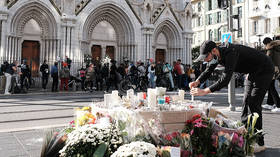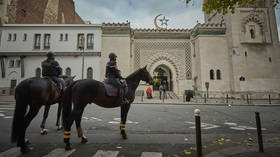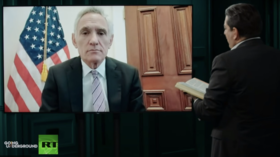Karin Kneissl: Islamist attacks and the unique French secularism
Gruesome terrorist attacks have moved France deeply – attacks on a republic which has for years strived to keep church and state separate. Freedom of religion is thrown into the spotlight amid a pandemic and Islamic terrorism.
Last month, in a Paris suburb, in front of the school in which he taught history and geography, the teacher Samuel Paty (47) was murdered and beheaded. The perpetrator was an 18-year-old Islamist whose Chechen family came to France as refugees in 2008 and were granted asylum in 2011. The trigger for this grisly attack was the fact that Paty had in a lesson discussed with his students the topics of freedom of expression and secularism using caricatures of Islam. This attack deeply moved France and debates in families, politics and the media rage on. Five days later, the victim of the terrorist attack was remembered with honours at the Sorbonne by President Emmanuel Macron. “The teacher Samuel Paty made republicans of his students” was one of the salient points of the president’s emotional speech.
A week later, another gruesome attack shook the city of Nice. Three people were killed at a Catholic basilica, one of the victims partially beheaded. The attacker, allegedly a Tunisian refugee who had come to France via Italy only days prior, shouted ‘Allahu akbar’ repeatedly as he perpetrated his horrid crime.
French republicanism, invoked in Macron’s eulogy for beheaded teacher Paty, is borne out of the French Revolution of 1789. A rigid separation of church and state arose amidst the revolutionaries’ Reign of Terror. In 1905, laicism then became a still valid foundation of France. What is meant by this and how this uniquely French characteristic arose will be outlined in this piece.
The situation is continuing to worsen, with the call to boycott French products in the Islamic world as a result of the newly stoked debate on Islam in France. Please note, this is nothing new. The topic has spawned much literature and many seminars and time and time again has led to diplomatic rifts between Paris and the rest of the world. In the past decade, terrorism and other forms of violence have on multiple occasions attacked the long-held tradition of secularism and its uniquely French manifestation in laicism.
Republicans, Islam and global politics
The term ‘Islamic separatism’ has regularly surfaced in Macron’s discourse in the past few weeks; a law to ban it is to be passed in parliament in early December. An international dimension has now arisen in this inflamed national debate, which also deals with the positioning of weakened political rivals, the far right. Turkish President Recep Tayyip Erdogan has now taken up the topic, which first caused a stir in international politics in 2005-06 due to Danish caricatures, with very personal attacks on Macron. Paris and Ankara have been on course for confrontation for some time – whether in Libya, the eastern Mediterranean, or in Syria, to name just a few arenas.
All the while, history and the present, indiscriminate violence and above all heightened emotions dominated world affairs. As is written in the Book of Ecclesiastes, “There is nothing new under the sun.”
Almost nowhere else in Europe did the religious wars once rage as intensively as in France. Protestants rose up against the Catholic king and by extension the state’s authority, as was the case in Germany with the Habsburg Empire. It was about more than just theology, it was about the division of power. The turmoil of the Thirty Years War is a gruesome illustration of how war becomes a business; almost half of the population in areas of conflict died. The struggle over religious freedom and with it the recognition of the reformed Church, the one which followed the teachings of John Calvin of Geneva, played out in the French Empire over the centuries. The Reformationists were also known as Huguenots. The name may come from ‘Eidgenossen’ (or ‘those bound by oath’), making it of Swiss origin, which can be explained by the connection to the Swiss Reformation.
The St Bartholomew's Day Massacre on the night of 23 and morning of 24 August 1572 was just one bloody chapter in the long line of violent conflicts which was broken through attempts at reconciliation such as the Edict of Nantes in 1598. Louis XIV repealed this in 1685, which in turn forced the Huguenots to flee. The still insignificant Prussia was to profit from these emigrants, since they brought with them education and entrepreneurial spirit. Their descendants still bear French names today.
Also on rt.com As four are killed in Austrian attack, remember not all terrorism victims die. Some, like my friend, live with invisible scarsProtestant resistance
In the Cevennes Mountains in the north of Provence, however, the Protestants stood their ground and refused to flee. In 1702, there was a revolt among the Camisards, the name ‘Camisard’ meaning ‘shirt wearer’. Over a century ago, the once-home of the revolt’s leader, Pierre Laporte, known as ‘Rolland’, was repurposed as a museum. The tales of heroism of every uprising quickly become the stuff of legend, but also serve as model cases of a partisan struggle. Night raids and guerilla tactics – such as civilians hiding stowaways and building many small combat units that confused the soldiers of the royal army – made up this revolt. Believers also gathered for church services in the forest, another act of resistance. Children also roamed the country as prophets and were worshipped as voices of divine messengers. An undoubtedly wild time, but one which may not seem so strange in our absurd present of numerous religious wars and warnings of the end of the world.
A few decades later, the French Revolution followed, with its ‘Terreur’, during which religious heritage was undermined. Similar to the Russian October Revolution, belief, clergy, and churches alike disappeared from people’s previously thoroughly religious everyday lives. Religion returned when the monarchy was reinstated after the end of the Napoleon dynasty.
Rigid separation of politics and religion
When it comes to the role of religion, the Revolution of 1789 left behind profound traces. The ‘citoyen’, that is, the citizen who should be free of all religious or related ethnic ties, was the republican ideal. France tried to export said ideal to the rest of the world through francophony and colonialism. The success is moderate, because apart from Kemal Atatürk, the founder of modern Turkey in 1923, hardly any societies outside of France could warm to it. Are the people in the rest of the world really so pious? The Kemalists in Turkey, which has changed greatly in the name of Islam, are of course weaker than they were. Even secular France is home to Marian devotion and large masses. However, religion is locked out of the administration and the entire public sphere.
In any case, the republican concept of citizenship has fascinated me since my youth, because the individual is free to move forward through accomplishment. Neither family, ethnicity nor religion count, rather it is purely based on meritocracy, or achievement. This is something I did not know in Austria, where other criteria open or block the individual's path. In Vienna, the individual citizen and their talents count much less towards progression than their connections to diverse cliques.
The separation of church and state was normalised by law in 1905. The law on laicism, which French Premier Émile Combes fought to pass in the face of strong resistance of those loyal to the church, applied primarily to the Catholic Church. But in the spirit of neutrality, other denominations were also included. France has been laicist since then, as stressed in Article 1 of the Fifth Republic's Constitution of 1958. What does this mean in practice? The state doesn't permit lessons on religion at public schools, and legally speaking, religious communities are simply private associations and are financed as such. Furthermore, wearing religious symbols at public schools has been banned since 2004. First and foremost, this includes the head scarf, which is partially recognised in Islamic practice, but not in the Koran. The same rules apply to the Jewish Kippa or Christian symbols on necklaces, which are also not permitted in public schools.
At the beginning of the 20th century, monarchists, the clergy, the military and many bourgeois circles fought intensively against this legislation, but ultimately it was in vain. It is true that alliances of this kind again emerged with the citizens’ movement ‘Manif pour tous’ (Demonstration for All), which was initially directed against same-sex partnership and then took up many other issues during François Hollande’s term in office. Of course, the real problem with rigid secularism today is more likely to be with the radicals among the six million or so Muslims estimated to live in France.
The second and third generation of Maghrebis, the vast majority of whom originate from north-western Africa, often feel left behind, even more so in times of economic hardship. In contrast to people from Turkey or the Arab countries who immigrated to the German-speaking world, the question of language never arose for the vast majority of Muslims. Because most Arabs living in France usually speak excellent French. I owe my knowledge of the French language above all to Arabic friends, which later enabled me to gain a place at the Administrative Academy of the ENA. It was here that I not only learnt so much about French administration, which among other things, has been exported to the EU’s institutions, above all, I learnt a lot about French self-perception, which sees itself rooted in a secular society. This is also the basis for everything that falls under ‘universalism’ in France. This is because the very values which the French Revolution produced with much violence and destruction, ‘freedom, equality and fraternity’, are considered central themes to all people at all times. Enabling you to do the same – France saw and still sees this as its global political responsibility. This concept suffers not only from loss of significance internationally speaking, but also from many internal cracks. The world has turned in a completely new direction, whereby the return of the religious – as the French minister of culture and writer, André Malraux, is said to have formulated it 70 years ago – plays a role. After all, the statement that the 21st century would be a religious one is attributed to him, although it is unclear whether he was thinking only of a renaissance of spirituality or the role of religion as a political agenda.
Islam and laicism à la française
The Parisian sociologist Gilles Kepel wrote numerous empirical studies on the return of religious ideas in France in the 1980s. In them, he concerned himself with radical preachers in the many ‘Banlieues’, or the often-neglected suburbs of the large French cities, at a time when this topic’s arrival in politics was a way off. His book ‘La Revanche de Dieu’ (The Revenge of God) was published 30 years ago and provided a comparative account of the growing political influence of Evangelicals in the US, Islamists in the Muslim world, as well as national religious Hindus and Jews. Kepel should have maintained his course with the research done during that time. However, in 2000 he wrote 'Jihad: The Trail of Political Islam', in which he put forward theories about the end of political Islam, which proved to be false. Although, in his early work Kepel presented some accurate investigations.
Studies and publications on the positioning of a ‘republican Islam’ have created a business around Islam. In France, however, the topic would soon go beyond academic debate. The list of Islamist-motivated attacks is long. The year 2015 began with the attack on the editorial staff of a satirical magazine that regularly made fun of all religions with caricatures and ended with the attack on the Bataclan Theatre. The attack on the teacher Paty awakens memories of violence and intimidation, and a great movement of solidarity has since been sweeping the nation. In particular for the often-reviled teachers, who can give many examples from difficult disputes about Islam.
Macron knows that the majority of the French population is behind him when he upholds secularism as the core of republican ideals and it dominates daily politics to such an extent that even the reconfinement, the return of total lockdowns, which apply from 9pm to 6am, fade into the background. Now, with the additional pressure from outside, as seen in recent days with calls for boycott from the Islamic world, a déjà-vu of emotions arises. However, during the pandemic, nerves are already frayed, as the economic crisis and social tensions affect societies both in France and elsewhere. It is almost a paradox of history that especially in revolutionary and secular France, the religious wars have once again shaped the country. Now would be the time for a policy of reconciliation, not the confrontation akin to Louis XIV. Although he won the religious war of his time, he also sought an alliance with the Ottomans.
The statements, views and opinions expressed in this column are solely those of the author and do not necessarily represent those of RT.

















